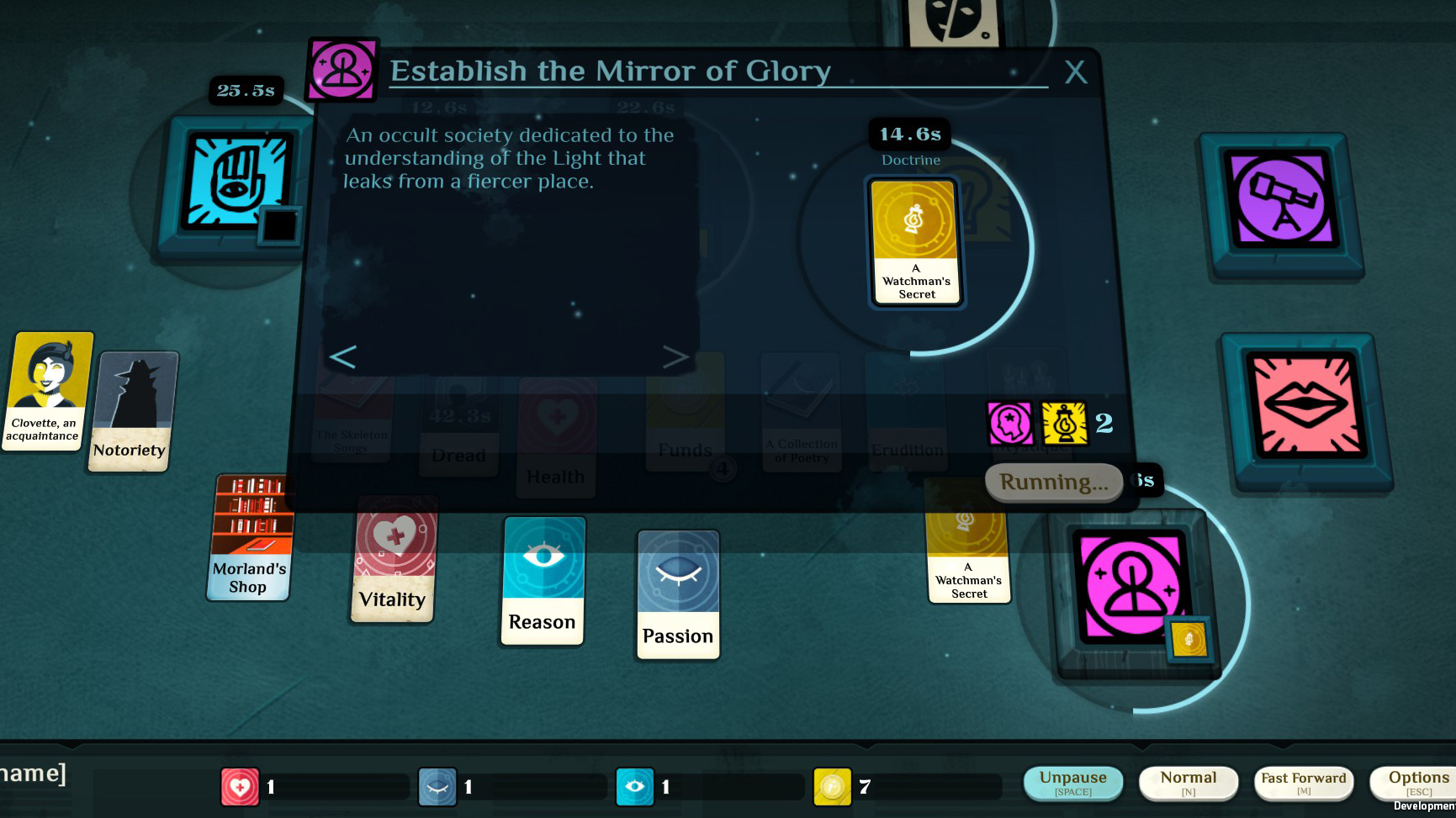Our Verdict
A dark, engrossing, and challenging narrative card and crafting game.
PC Gamer's got your back
What is it? A singleplayer card game about founding a Lovecraftian cult.
Expect to pay: $20/£15
Developer: Weather Factory
Publisher: Humble Bundle
Reviewed on: Intel Core i5-6600K @ 3.50 GHz, 8 GB RAM, Nvidia GeForce GTX 980
Link: Official site
While I'm earning a living as a portrait painter I'm simultaneously studying a forbidden tome of occult writings, meditating on my goal of obtaining unearthly power, sending followers to retrieve an artifact from a mysterious circus, and dispatching a hulking brute to eliminate the dogged Inspector Wakefield. That damn Wakefield is a thorn in my side, repeatedly investigating and accumulating evidence against me. My paid goon doesn't kill the detective but abducts and imprisons him in my cupboard, where he eventually starves to death, leaving me a decomposing corpse I'm hopeful I can find a use for.
That's a pretty average day in Cultist Simulator, a morbid and deeply engrossing single-player narrative card game set in the 1920s. The goal is to establish a Lovecraftian cult. You'll collect and study unspeakable grimoires, carry out unthinkable rituals, attract a devoted cadre of followers, and find a way to finance your obsessions—all while trying not to lose your mind along the way.
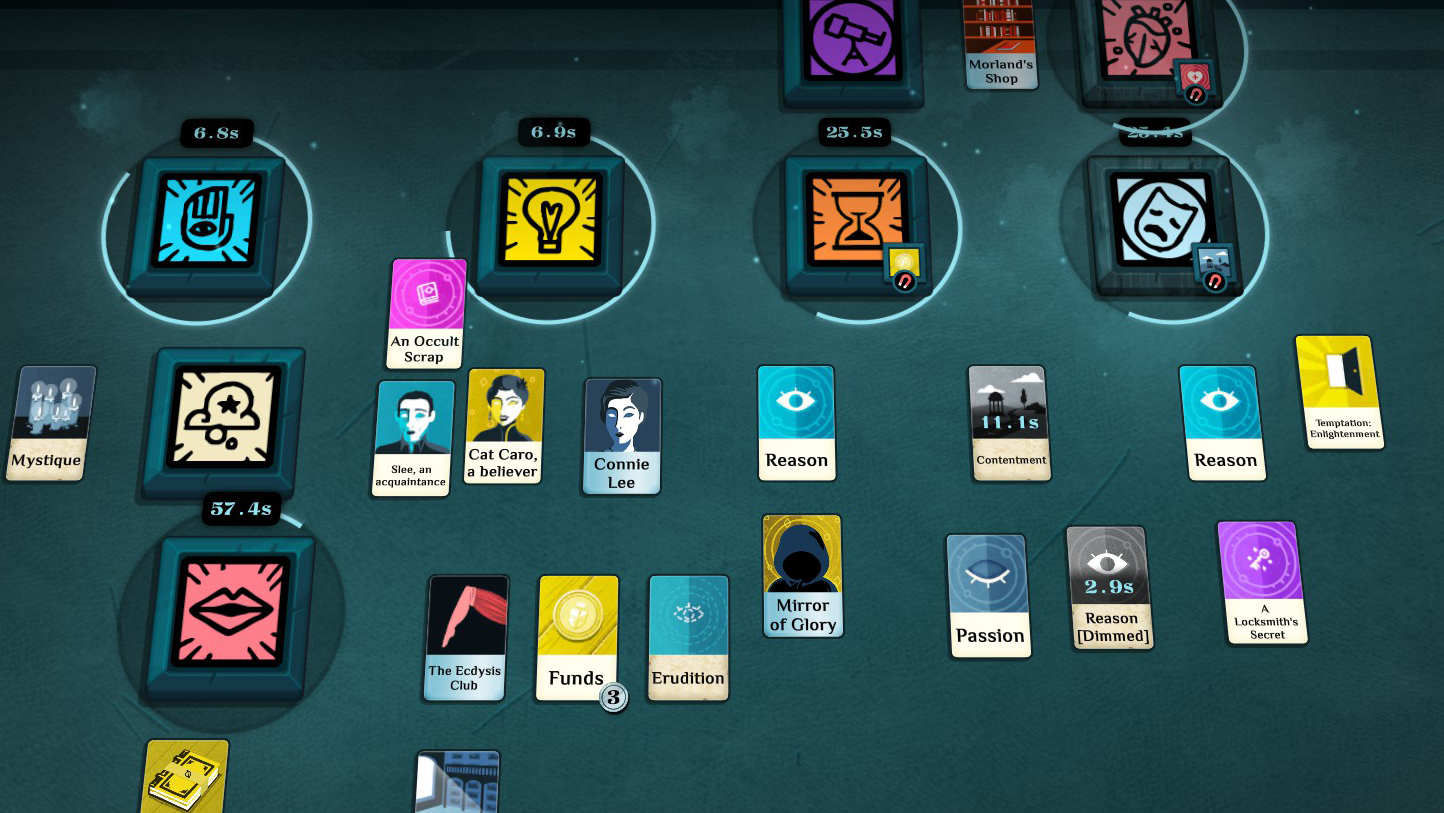
Whichcraft
You begin Cultist Simulator with just a single card on your table, called 'menial employment', and place it in your only tile: Work. When the Work tile's timer expires, you get the job card back and also a funds card: your earnings. Congratulations, you've just crafted a living and learned the basics. As time passes, more tiles and cards appear, and by placing new cards in new verb tiles—Study, Explore, Dream, and Talk—you'll craft more cards. Eventually your once-bare table will be covered with cards, provided you survive long enough.
At first, you probably won't survive long at all. An Illness token may appear and spit out an affliction card, eating away your health. Dread will consume you if you don't find a way to fight it off. A Time tile steadily sucks your funds away and if you go broke you'll quickly starve to death. And as you study the occult and begin talking to like-minded people, you'll gain notoriety, attracting nosy journalists and pesky cops.
These threats to life and sanity crop up constantly and managing them, along with your occult studies, day-to-day finances, and health, can be exhausting at times, a plate-spinning act that can thankfully be paused with a keypress so you can catch your breath and mull over your options. Dying or otherwise failing restarts you from the beginning again, armed only with whatever you've managed to learn about the game and the choice of a new starting scenario. Maybe this time you'll begin as a physician treating an unusual patient, or a police inspector whose troubling casework haunts him. My favorite is the directionless debutante, whose early game is flush with inherited cash and relaxing visits to social clubs. Anything to avoid real work.
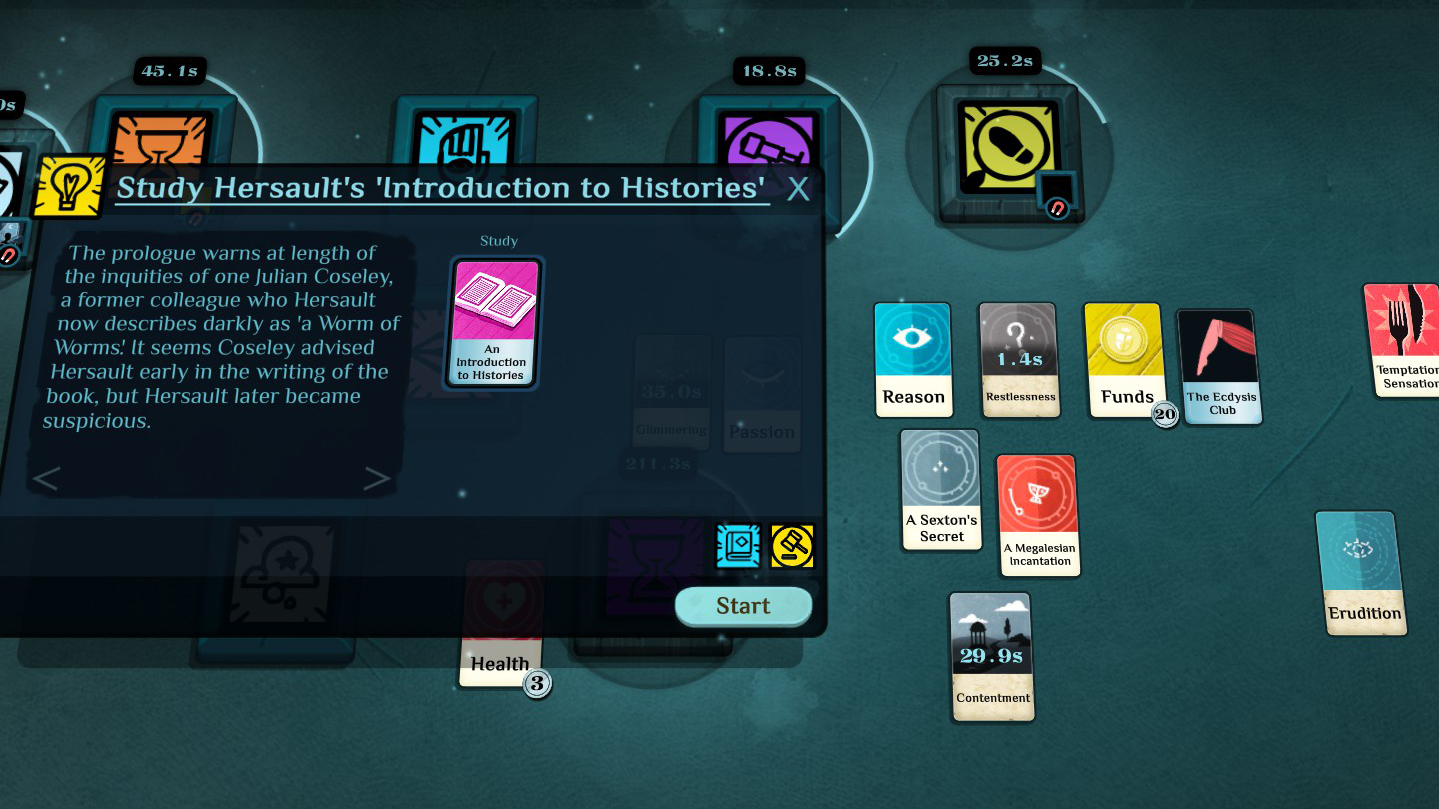
Cult following
I feel invested in my little disciples and I don't want them to be horribly killed by Worm-touched circus folk.
After a few games spent learning how to manage the basics of self-preservation, you'll be able to focus on the intriguing stuff: forming your cult. You'll slowly gather a diverse library of lore by visiting bookstores and auctions and even your own dreams. These lore cards can be studied and translated to advance your understanding of the invisible arts and choose the guiding principles of your cult. Experimenting with combinations of your gathered literature, you'll eventually gain the ability to enter a dreamworld in which your card table is briefly replaced by a map of sorts, a doorway that contains more doorways. For your character it's another step along the mysterious path to enlightenment, and for you it's another tantalizing piece of the puzzle of understanding how Cultist Simulator works and how you might succeed.
Attract a few followers and hirelings to your cult and you'll be able to send them on errands. Have them explore the city for you and bring something (or someone) back. Tell them to deal with a detective or dispose of the evidence against you. Send them on long, tense expeditions into spooky castles and carnivals, waiting wide-eyed to see what they return with, or if they return at all. I know I shouldn't grow too attached to my followers—I occasionally need to sacrifice one, after all—but I can't help it. I feel invested in my little disciples and I don't want them to be horribly killed by Worm-touched circus folk.
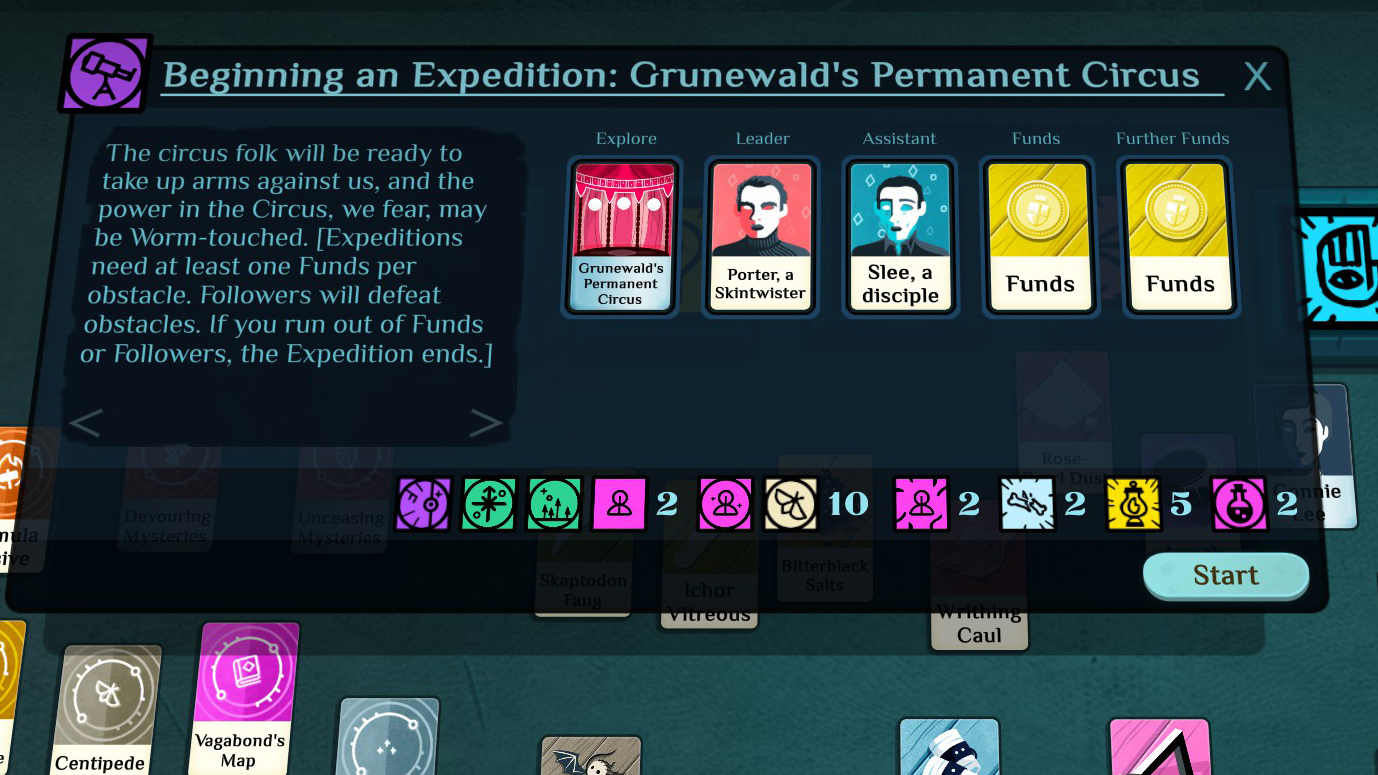
Each game is a great blend of fresh experiences and growing familiarity.
There are also recurring characters you'll meet, and discovering what they want and how they'll act helps in later playthroughs. Someone surprised me by demanding a blood offering in exchange for a donation to my cause, and as I hadn't recruited a follower yet, I became that grim sacrifice. Game over. The next time I met this investor, I knew exactly what they'd ask of me, and made sure to enlist some poor sap to die in my place.
But each new game feels different from the last, too, thanks to the different approaches you can take—in one game I built myself into a physical dynamo through manual labor and exercise, which wound up making my health management a snap. It's also exciting to see a particular lore or character or location card reappear, one you saw in a prior game but didn't have the time or resources to use, and get to follow it down a new avenue. In this way, each game is a great blend of fresh experiences and growing familiarity. It can be nearly heartbreaking to fail and see your precious table of carefully collected cards erased in an instant, but each failure comes with a bit more knowledge of how the game works and how to avoid whichever disaster befell you the last time.
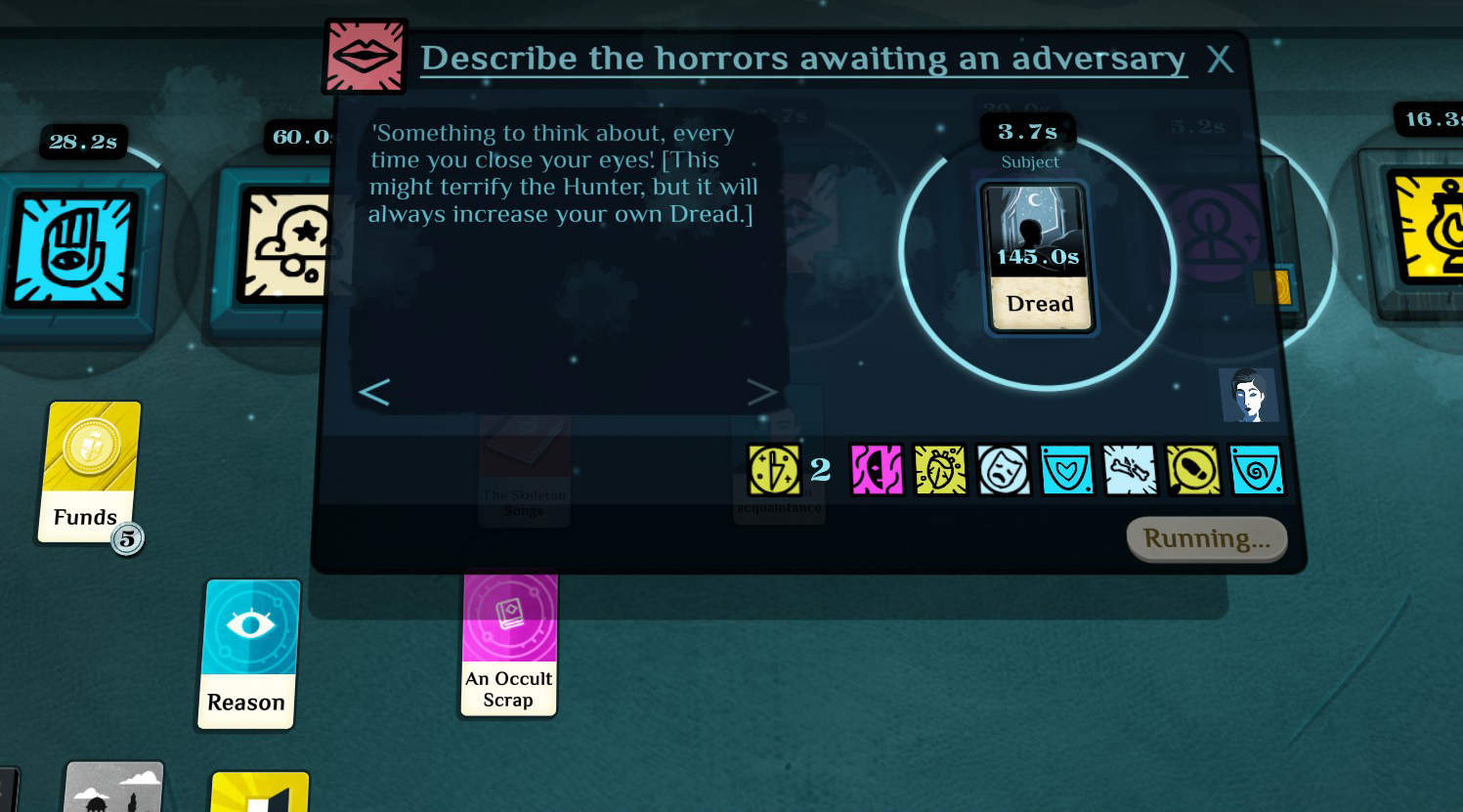
Text messages
Cultist Simulator is long game, and since even ultimately unsuccessful sessions can last for hours a few actions can start to feel repetitive (feeding the Work tile, particularly, and dealing with a few other recurring events). I'm also flat-out begging the developers to add a snap-to-grid option for the table because I apparently can't stand slightly uneven cards (this is news to me). It's still impressive just how much is simulated on a virtual tabletop with nothing but with cards, tiles, ominous background music and sound effects, and slowly expiring timers.
There's no voice work, and none is needed because it's a brilliantly written game. The text is economical, just a short line or two of description for each card or event, yet it's awash with intrigue and deftly paints a portrait of the mysterious and horrifying alt-history you inhabit. I'm not a Cthulhu or Lovecraft guy, but I loved to examine and ponder every little bit of text I came across. I'm also not usually a card game guy (unless poker counts) but I found it fascinating to try out new card combinations just to discover what would happen.
Like when a nosy detective foiled my two attempts at abducting him, but I then discovered I could share a newly-acquired dread card with him instead, scaring him into dropping his investigation. After all, I'm consumed with despair and hopelessness. Maybe it's time he was, too.
A dark, engrossing, and challenging narrative card and crafting game.

Chris started playing PC games in the 1980s, started writing about them in the early 2000s, and (finally) started getting paid to write about them in the late 2000s. Following a few years as a regular freelancer, PC Gamer hired him in 2014, probably so he'd stop emailing them asking for more work. Chris has a love-hate relationship with survival games and an unhealthy fascination with the inner lives of NPCs. He's also a fan of offbeat simulation games, mods, and ignoring storylines in RPGs so he can make up his own.
